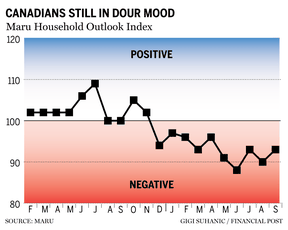Canadians have begun stashing away money in anticipation of a rough patch, poll shows

Article content
Canadians were feeling somewhat better about the economy heading into October, although only because more households had begun stashing away money in anticipation of a rough patch, a new poll showed.
Advertisement 2
Article content
Maru Public Opinion‘s Canadian household outlook index — shared exclusively with the Financial Post — rose to 93 in September from 90 in August. While directionally positive, the result suggests the mood of consumers is dour, dictated more by high inflation and spiking interest rates than a strong labour market and rising wages.
Article content
Article content
Any score below 100 is indicative of a negative sentiment, while scores above 100 are considered positive, so Canadians were far from enthusiastic about the economy as summer turned to fall.
Some 65 per cent of respondents said they thought the economy was on the “wrong track,” compared with about 50 per cent who thought so a year earlier, a shift that tracks the global panic over inflation amid supply problems related to the pandemic and soaring commodity prices related to Russia’s invasion of Ukraine.
Advertisement 3
Article content
“Within a large swath of households across the country, there is an underlying, deep-seated pessimism on the economy both nationally and locally,” John Wright, Maru’s Toronto-based executive vice-president, said in a press release. “There is also an apparent growing group who have felt the pocketbook squeeze since May (likely inflation led), but it’s been more particular in the households of those who are middle-aged and older, likely experiencing either the impact of rising interest rates or battered investments — or both.”
There is an underlying, deep-seated pessimism on the economy both nationally and locally
John Wright
Maru Public Opinion, a subsidiary of global research firm Maru Group, comes up with its household index by asking a representative panel of about 1,500 people a series of questions designed to probe how they feel about the economy’s prospects over the next 60 days. The most recent poll was conducted in the first week of October.
Advertisement 4
Article content
The index hasn’t been above 100 since the end of 2021, which was about the time inflation began testing five per cent, a pace of year-over-year price increases that Canadians had rarely seen since the early 1990s, when the Bank of Canada set out to keep inflation at around two per cent. The Maru index dropped to 91 in May, and then to 88 in June, before recovering somewhat over the summer.

Households have soured on the economy even though the unemployment rate has been hovering around five per cent, lower than before the pandemic. That’s because concerns over inflation have come to outweigh the positives of the strongest labour market in memory. Statistics Canada’s consumer price index surged 8.1 per cent in June from a year earlier, the biggest increase since the early 1980s.
Advertisement 5
Article content
That might have been a peak, as inflation cooled to seven per cent in August. Still, wages are only growing at an average annual rate of about five per cent, which probably explains why so many people are negative about the economy: they feel like they’re falling behind every time they buy groceries or gasoline.
A drumbeat of recession forecasts probably doesn’t help, either. The Bank of Canada has raised its benchmark interest rate three percentage points since March, and probably isn’t finished.
“Let me be clear, what we don’t want is … inflation and wages to become unmoored to our two-per-cent objective, because if that happens, then we are actually going to need to slow the economy a lot more to get the inflation back to two per cent,” Tiff Macklem, the governor, told CBC Radio over the weekend. “That’s (why) we have been what we call ‘front-loading’ our interest rate increases.”
Advertisement 6
Article content
Maru’s polling suggests Canadian households are doing some “front-loading” of their own.
-

Canada’s unemployment rate drops to 5.2%: What you need to know
-

Low-flying loonie means interest rates could stay higher for longer
-

CEOs are convinced a recession is coming, but small businesses aren’t so sure: KPMG
Only 35 per cent of respondents said it was “likely” that the economy would improve over the next two months, down from about 40 per cent in the summer. The broader index strengthened, however, because a greater number of Maru’s panelists said it was unlikely they would start to worry about their finances. That’s probably because more households have been getting ready for a rainy day: 66 per cent said they would have enough money to cover unexpected costs or needs over the next 60 days, compared with 62 per cent the previous month.
Advertisement 7
Article content
“The beauty of a multi-component index is that it can detect some silver linings in the black clouds,” Wright said in the release. “The elements that pushed the index slightly higher this month came from two related areas: more Canadians intent on socking away some savings so they have more than two months of savings to cover unexpected costs or needs (maybe like provisions ahead of a major storm on the horizon), and a similar uptick in those who say they will put away more money for their retirement /old age security over the next two months.”
• Email: kcarmichael@postmedia.com | Twitter: carmichaelkevin



